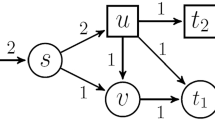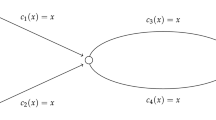Abstract
The flow and congestion control methods based on one-shot game model with non-cooperative game theory can explain the non-cooperative behavior of Internet users. However, the low efficiency of equilibrium solutions affects their utility. Here the behavior of flow and congestion control based on infinitely repeated game models is addressed; the repeated and infinitely repeated flow and congestion control game model is presented; the existence and optimization of the Nash equilibrium point are proved; the discount factor in repeated game is discussed; the punishment and threat strategy to users’ misbehavior is studied in N-users infinitely flow control game; the punishment restrictive method of users’ behavior is designed in infinitely and finitely games; finally, a flow control algorithm based on repeated game, FCAR, is provided based on the conclusions of repeated game model. The results of experiment and simulation show that FCAR algorithm could regularize and restrict users’ misbehavior effectively. FCAR algorithm can also make non-cooperative Internet users achieve cooperation in order to optimize the utility of the whole flow and congestion control system.
Similar content being viewed by others
References
Altman E, Boulogne T, Azouzi R E, et al. A survey on networking games in telecommunications. Comput Oper Res, 2006, 33: 286–311
Friedmn E J, Shenker S. Learning and implemention on the Inernet. Game Econ Behav, 1996, 16: 65–76
Shneidman J, Parkes D, Massoulie L. Faithfulness in internet algorithms. In: Proc. SIGCOMM Workshop on Practice and Theory of Incentives and Game Theory in Networked Systems (PINS’04), Portland, Oregon, USA, 2004. 220–227
Roughgarden T, Tardos E. How bad is selfish routing? J ACM, 2002, 49: 236–259
Key P B, McAulcy D R. Differential QoS and pricing in network: where flow control meets game theory. IEE Proc Softw, 1999, 146: 39–43
Garg R, Kamra A, Khurana V. Eliciting cooperation form selfish users: a game-theoretic approach towards congestion control in communication networks. Technical Report RI01001, IBM India Research Lab, April 2001. Available at http://www.research.ibm.com/resources/papersearch.html
Karp R, Koutsoupias E, Papadimitriou C, et al. Optimization problems in congestion control. In: Proc. of 41st Annual Symposium on Foundations of Computer Science, Redondo Beach, 2000. 66–74
Christin N, Grossklags J, Chuang J. Near rationality and competitive equilibria in networked systems. In: Proceedings of the ACM SIGCOMM Workshop on Practice and Theory of Incentives in Networked Systems Table of Contents, Portland, Oregon, USA, 2004. 213–219
Lai K, Feldman M, Stoica I, et al. Incentives for cooperation in peer-to-peer networks. In: Workshop on Economics of Peer-to-Peer Systems (P2PEcon’03), Berkeley, USA, 2003
Chen Y, Teo K H, Kishore S, et al. A game-theoretic framework for interference management through cognitive sensing. In: IEEE International Conference on Communications (ICC). Washington DC: IEEE Computer Society, 2008. 3573–3577
Tao J, Wu Q L, Wu Q. Application research of network resource allocation algorithm based on non-cooperative bidding game. Chin J Elect, 2006, 34: 241–246
Feldman M, Papadimitriou C, Chuang J, et al. Free-riding and whitewashing in peer to peer systems. IEEE J Select Areas Commun, 2006, 24: 1010–1019
He L, Walrand J. Pricing and revenue sharing strategies for internet service providers. IEEE J Select Areas Commun, 2006, 24: 942–951
Samuelson L. Evolutionary Games and Equilibrium Selection. Cambridge, MA: MIT Press, 1997
Basar T, Srikant R. Revenue-maximizing pricing and capacity expansion in a many-users regime. In: Proc. IEEE INFOCOM 2002, New York, 2002. 1556–1563
Bertsekas D P. Nonlinear Programming. Belmont, MA: Athena Scientific, 1995. 169–177
Efstathiou E, Frangoudis P, Polyzos G. Stimulating participation in wireless community networks. In: Proceedings of Infocom 2006: 25th IEEE International Conference on Computer Communications. Piscataway: IEEE Press, 2006. 1–13
Felegyhazi M, Cagalj M, Bidokhti S S, et al. Non-cooperative multi-radio channel allocation in wireless networks. In: INFOCOM 2007. 26th IEEE International Conference on Computer Communications. Piscataway: IEEE Press, 2007. 1442–1450
Johari R, Tsitsiklis J N. Efficiency loss in a network resource allocation game. Math Operat Res, 2004, 29: 407–435
Richard J, Venkat A. Optimal routing control: repeated game approach. IEEE Trans Automat Control, 2002, 47: 437–450
Author information
Authors and Affiliations
Corresponding author
Rights and permissions
About this article
Cite this article
Tao, J., Zhong, X. & Lu, Y. Restrictive mechanism of flow control among non-cooperative Internet users. Sci. China Inf. Sci. 54, 12–22 (2011). https://doi.org/10.1007/s11432-010-4145-z
Received:
Accepted:
Published:
Issue Date:
DOI: https://doi.org/10.1007/s11432-010-4145-z




